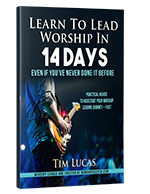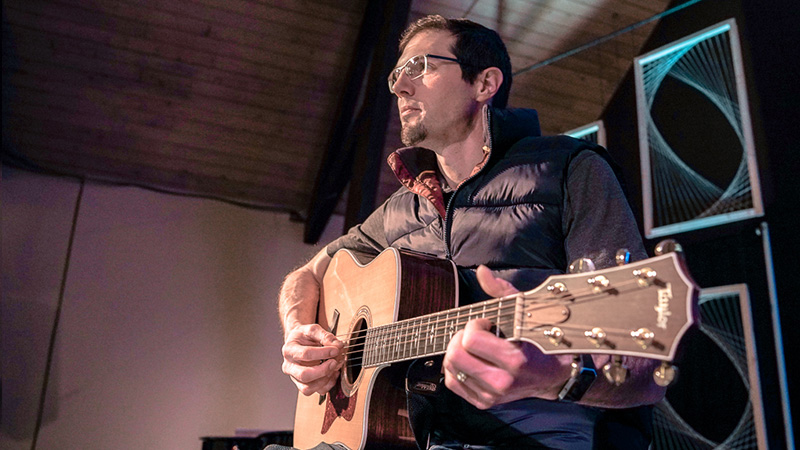Podcast: Listen Here
Subscribe:
>> See All Podcast Episodes Here
What Instrument(s) Should I Learn If I Want To Be A Worship Leader?
Many worship leaders are singers only — Jenn Johnson of Bethel and Kim Walker-Smith of Jesus Culture are examples that come to mind.
But I would argue that learning an instrument will expand your opportunities and make you a better worship leader.
So, which instruments are the best to learn? Or if you already know an instrument, what others should you learn to play?
>> Ready to launch your worship leading journey? Get the book “Learn To Lead Worship In 14 Days” here.
First of all, why learn an instrument?
You get more opportunities
Learning an instrument gives you many more opportunities to lead worship. If you always have to rustle up a band, an instrumentalist, or backing track, you’ll miss opportunities.
For instance, imagine a local church needs worship leader to fill in for a Sunday night small group. But the regular leader plays guitar and leads worship alone. If you don’t play an instrument, you have to find an instrumentalist to go with you or decline the opportunity.
And remember, each opportunity can lead to another. Who knows what future worship leading requests you just missed out on.
You can communicate to instrumentalists better
Learning an instrument teaches you about music so you can better communicate with your worship band.
Let’s say someone in the band is playing an A major chord, but it should be minor. As a singer only, you’ll know something is wrong, but might not be able to communicate that.
But as an instrumentalist, you know to tell the keyboardist to play a minor chord there. You can even get more specific by asking them to drop the third a 1/2 step: change the C# to a C natural.
Music theory, chord structures, and inversions become much more concrete if you can play these instruments yourself. Whether or not you plan to play while you lead worship, knowing how to play at least one instrument helps you be a better leader.
You can serve many non-lead roles in worship
As an instrumentalist, you can serve many roles within worship, not just the worship leader.
You can serve on a band before becoming a worship leader. This is something I highly encourage. You can learn how to lead worship from someone else without taking on all the pressure and responsibility at first. You’ll learn how to run rehearsals, choose songs, and more — just by serving the existing ministry.
The best worship leaders know how to serve other bands. To do this, use your instrumentalist skills, then slowly develop into a more regular worship leader.
So, what type of instrument should you learn?
The number one rule here is to learn an instrument that lets you play and sing at the same time.
That seems obvious, but it’s still the most important rule if you’re deciding which instrument to learn.
Why is it so important? You’ll find yourself in situations where you are the only one available to lead worship for a small group or even a church. You need to be a one-man or one-woman band. If you play violin or tuba, you’re gonna have a hard time.
A note about playing and singing at the same time
Playing and singing at the same time may seem impossible to you right now, but you can develop the skill over time if you work at it.
In the podcast, I review the best way to learn how to play and sing at the same time. Basically, you take a very simple song, and practice it piece by piece. Eventually you’ll have one song — and eventually many — that you can play and sing at the same time.
Learn a very common instrument
Another rule is to learn an instrument that you are likely to find wherever you are.
I’ve been in this situation many times. I show up at a missions trip, camp, or church, but don’t have my instrument. Either I couldn’t bring it on a plane, or I wasn’t expecting to lead worship.
But there happens to be a guitar, piano, or keyboard there. I lead worship, just using what’s available to me at the time. Since I can play keys and guitar, many opportunities have arisen over the years — quite unexpectedly sometimes.
 If you want to learn everything you need to know about starting to lead worship, check out my book, “Learn to Lead Worship in 14 Days.” It will guide you through the process of working up to your first worship session even if you’ve never led worship before. And the best part is that it’s going to take you 14 days to do it.
If you want to learn everything you need to know about starting to lead worship, check out my book, “Learn to Lead Worship in 14 Days.” It will guide you through the process of working up to your first worship session even if you’ve never led worship before. And the best part is that it’s going to take you 14 days to do it.
Or, if you lead a worship ministry and you’re looking for a how-to guide to hand every new worship leader, this book is for you.
>> Click here for this valuable resource.
Top 3 Instruments To Learn As A Worship Leader
#3: Electric guitar
As an electric/lead guitar player, you’ll get a lot of opportunities as an instrumentalist. A lot of churches don’t have a lead guitarist who can do all those great lead lines in worship music these days.
Hillsong, Jesus Culture, Chris McClarney, Elevation, and other artists are now including simple but powerful lead guitar parts that even newer guitarists can play.
These parts add so much to the songs. Unfortunately, not every church has a lead guitarist. But if you learn, you can easily become part of the band, and perhaps eventually lead worship.
A bonus is that you can lead worship very nicely from electric. The range of tones you can get is incredible.
One of the worship leaders at my church plays lead guitar while leading worship. This blows my mind, but he does an awesome job!
But, even if you’re just playing chords (like I do when I lead worship from electric), the sounds available to you are amazing. You have effects like reverb, delay, and crunch that you just can’t get from acoustic. Achieve that ethereal, washy sound without a lot of pedals or super high skill level.
And, your skills are easily transferrable to acoustic guitar. It’s like learning two instruments in one.
#2: Piano
I started playing piano first, then I transferred my skills to guitar. I especially like piano as a worship leader for a number of reasons.
First, it helped me learn music theory more easily. It’s easier to “see” theory on a piano — at least for me. I have a much harder time seeing chord inversions, scales, chords etc. on a guitar. If you know music theory, you’ll be able to learn songs and play by ear much easier.
The piano is also a super common instrument you’ll find in just about any church. Plus, if you know piano, you can transfer those skills to keyboard, which is a highly sought-after skill in churches these days with the rise of keyboard- and electronic-driven music.
As mentioned before, knowing piano and keys will give you opportunities within existing teams and get your “foot in the door” to lead worship eventually.
And, call me old-school, but I love the good old-fashioned acoustic piano for its ability to foster an atmosphere of worship in a room. You have an incredible range of sounds, tones, and rhythms to lead everything from soft ballads to faster tunes.
The obvious drawback to piano and keys is that they are not as portable as guitar. That’s why I eventually transitioned to leading worship primarily from guitar, although I do love getting back behind the piano once in a while to lead worship.
#1: Acoustic Guitar
The acoustic guitar takes the #1 spot for instruments you should learn as a worship leader (according to me).
This is for a couple of reasons.
Guitars are super common. You’ll find one just lying around at churches, camps, and people’s homes. Just grab it and lead worship.
Plus, it’s super portable. I actually started leading worship from piano and keyboard, but transitioned to guitar at the age of 17 because it was more portable. I started leading worship at camps and other venues where hauling a huge keyboard was not feasible.
So I purchased an acoustic guitar from a friend for $30. It was quite easy to learn after knowing basic musical concepts from my years of piano. I fell in love with the portability of the instrument, and I felt I could lead fast songs a bit easier.
But slow worship songs didn’t suffer from my transition from piano to guitar. The range of dynamics (loud and soft) from this instrument is incredible. You can lead everything from an upbeat, loud worship song to the quietest ballad.
One more reason acoustic guitar takes the top spot: You don’t need any additional equipment. With keys or electric guitar, you need amplification.
But you can literally be dropped in the most remote part of the world with an acoustic guitar and start leading worship with zero extra equipment!
The Bottom Line
We looked at why learning an instrument is important as a worship leader, and which instruments to learn.
- Learning an instrument opens up opportunities
- To ensure the most opportunities
- Learn an instrument that lets you play and sing at the same time
- Learn a common instrument
- We reviewed the 3 best instruments to learn (in my opinion anyway!)
- #3: Electric guitar
- #2: Piano
- #1: Acoustic guitar
Learn To Lead Worship Better
Are you looking for a resource that will help you get started leading worship or improving your skills?
Check out the book “Learn To Lead Worship In 14 Days.” It’s a step-by-step, day-by-day handbook that can launch your worship leading journey in as little as two weeks.

Thanks for this. I would like to ask for how I can get those books, and their costs. Thank you.
Hi Samson, you can find out more details about the book at https://www.worshipdeeper.com/book